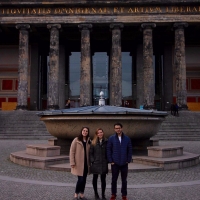Experience is the best teacher, and Elliott students immerse themselves in skills-based training, putting classroom learning to the test through internships and fieldwork. For graduate students, real-life learning experience peaks in the year-long Global Capstone Program, which requires MA candidates to identify and tackle some of the most pressing international issues of our day.
In teams, students zero in on a challenge, design a research plan, and select a real-world client partner – these have included outfits such as the International Rescue Committee, World Bank Group, Global Initiative Against Transnational Organized Crime, and USAID. The result? A viable policy solution, both written and presented at a major conference each April.
“The most rewarding aspect was realizing we were conducting novel research on an issue that each of us cared about very much,” said Lili Martinez, MA ’17, who traveled to Berlin to talk with Syrian refugees there. “Further, we felt we were encouraging credible changes through our recommendations – changes that might positively affect the lives of refugees and displaced people.”
Grants for this kind of international travel are awarded through a highly competitive process. In 2017, for example, 123 students received awards for research in far-flung spots from Colombia to Vietnam.
Many such grants are made possible by members of the extended Elliott community. Recently, Wes Callender, ESIA BA ’76, made a major commitment to the program and explained why.
“If the capstone project provides a career or personal-life enriching experience for a few of the students, I will consider the funding a success. I like to see these young, aspiring professionals have opportunities that I never had,” Mr. Callender said.
Mr. Callender has devoted his career to work in the public and non-profit sectors. He actively advocates for international development and human rights causes, with a particular interest in grassroots movements across Central America. Here, he has directly observed the “critical need for internationally-minded professionals” with firm grounding in practice.
Through its Global Capstone Program, the Elliott School is doing its share to create this important cadre of professionals, educating emerging leaders and providing them with the skills to shape both their careers and a brighter future for the world around us.


